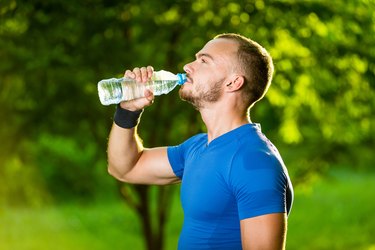
Water makes up about 60 percent of your total body weight, and you lose and replace about 2 to 3 liters a day. Some days, it may feel like you retain more water than you lose. Water weight shows up on your body as swollen fingers and ankles, a bloated belly and sluggishness. Lots of things influence how much excess water weight you carry: what you eat and drink, your lifestyle habits, your workouts and even the ambient temperature. As long as your water retention isn't related to a medical condition or a prescription medication, you can use a few easy strategies to help reduce water weight.
Men Can Cut Back on Salt
Video of the Day
Consuming salty snacks, such as pretzels and potato chips, as well as eating sodium-laden meals from restaurants, can cause you to hold onto water weight. Other foods that are a staple in a man's pantry, such as canned soups, cheese, packaged breads, bottled vegetable juice, frozen meals, hot dogs, sausage and ham, also contain large quantities of sodium and could cause the bloat. Keep your sodium intake to fewer than the 2,300 milligrams a day, as recommended by the 2015 U.S. Dietary Guidelines for Americans. If you have heart or kidney problems, keep your sodium intake a little lower, to the 1,500 milligrams the American Heart Association recommends.
Video of the Day
To lose water weight, clean up your diet to limit processed foods and foods from restaurants. Fill one quarter of your plate with home-cooked lean proteins, such as grilled chicken or broiled lean steak, which are seasoned with citrus or vinegar, fresh herbs and spices. On another quarter of your plate, serve a starchy vegetable, like sweet potatoes, or a whole grain, such as brown rice or whole-wheat pasta. Load the last two quarters of your plate with watery, fibrous vegetables such as salad greens, peppers, broccoli or cauliflower. The fiber helps flush out excess water to help you feel full.
The potassium in fruits and vegetables, such as bananas, mushrooms and leafy greens, also encourages a healthy fluid balance. Potassium helps counter the bloating effects of sodium, as it helps you to urinate more and to pass more sodium in your urine. Yogurt, fish and avocados are other rich sources of this mineral.
Drink Up to Reduce Water Weight
If you always leave a water bottle at the gym and you don't have one at your desk, you might be encouraging your body to retain water. When you don't drink enough liquids, your kidneys may hold onto water they do have as compensation.
A man needs about 125 ounces of fluids daily for good health, but not all your water intake needs to be plain drinking water. Water-laden foods as well as other beverages also count as fluid. For example, watery vegetables and juicy fruits help hydrate you better than bread, meat and cereal. Orange juice at breakfast, iced tea and watermelon at lunch and chicken soup at dinner also contribute to your fluid intake.
Get Up and Move
If you stand in one spot, sit at your desk or in your car for long periods, this can cause fluid to pool in your feet and ankles. To minimize this water retention, get up and walk, when you can -- even if it's only for a quick jaunt to the water cooler. Try to prop your legs up when you're working at your desk or when you're watching television.
Getting regular cardiovascular exercise also helps your circulation so you will sweat out extra water weight. Don't forget to hydrate after a sweaty workout to keep your body's fluids and electrolytes balanced. Drink 8 to 16 ounces of water before and during exercise and at least 16 to 24 ounces after exercise.
Lighten Up On Carbs
A diet that's heavy in carbohydrates, especially refined carbs such as those in white bread and pasta, can cause you to retain water. When you consume carbohydrates, your body converts the carbs to glucose, and stores some of the glucose as glycogen in your muscles and liver. The fluid retention comes from water that's stored with the glycogen.
The sudden boost of insulin you experience after eating refined carbohydrates also results in retained water. When your body releases insulin, the kidneys reabsorb sodium, causing fluid retention.
Even though you need some carbohydrates to promote good health and energy, choose whole grains, fruits and vegetables. Skip the pizza crust, burger buns and white rice. If you're feeling bloated, try to avoid refined carbs and reduce your overall carbohydrate intake slightly for a day or two to see doing this helps. A lower carb meal might consist of scrambled eggs with peppers and mushrooms and an apple as a side; grilled chicken with sauteed peppers and onions and a small sweet potato; or, roast salmon with 1/2 to 1 cup of brown rice and roasted broccoli.
- Scientific American: To What Degree Is a Person's Body Weight Affected by the Ambient Temperature and Humidity? Do We Conserve or Release Water as the Climate Changes?
- CNN: Expert Q & A: What Can I Do to Stop Retaining Water?
- Authority Nutrition: 6 Simple Ways to Reduce Water Retention
- Experience Life: Drink to Your Health
- American Council on Exercise: Healthy Hydration
- Institute of Medicine: Dietary Reference Intakes for Energy, Carbohydrate, Fiber, Fat, Fatty Acids, Cholesterol, Protein, and Amino Acids
- ABC News: 4 Confusing Weight Loss Concepts Cleared Up
- U.S. Dietary Guidelines for Americans 2015: Executive Summary
- American Heart Association: Shaking the Salt Habit